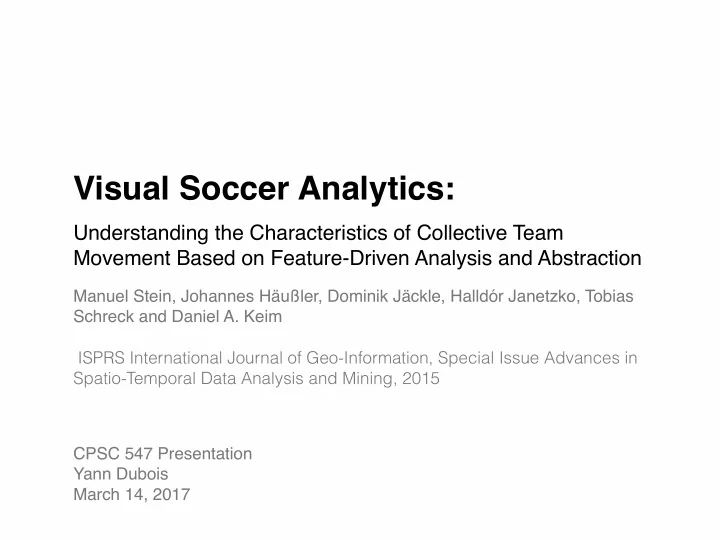

Visual Soccer Analytics: Understanding the Characteristics of Collective Team Movement Based on Feature-Driven Analysis and Abstraction Manuel Stein, Johannes Häußler, Dominik Jäckle, Halldór Janetzko, Tobias Schreck and Daniel A. Keim ISPRS International Journal of Geo-Information, Special Issue Advances in Spatio-Temporal Data Analysis and Mining, 2015 CPSC 547 Presentation Yann Dubois March 14, 2017
What: Data Single Soccer Game • Mainly geometrical data • Data every 100 milliseconds • Manually annotated events (fouls, goals …) 2
Data 5 Overview 1 4 1 3 2 2 https://www.janetzko.eu/project/soccer/ 3
Why The need of a software • Increasing demand from clubs • Now we can • Video analyst: 3 working days per opponent team • Current support from system is limited • Visualisation to not get overwhelmed by data 4
Why Improve previous work • No (good) automatic identification of situations ‣ Need expert verifications ‣ Doesn’t support domain knowledge ‣ : classification method but no explanation 1 5
Why Tasks • Support experts in exploring characteristics of situations • Incorporation of meaningful features describing situation • Visualisation with interactive re-ranking of features and search for similar situations 6
Why How Workflow Figure 1. Previous workflow 7
Why How • Intervals: General time interval • Move: Ball possession Workflow • Event: Foul / goal / … Figure 3. New workflow 8
Why How Workflow Interval selection: • Manual or automatic • Shows data of interest • Main reason of use 9
Why How Workflow Binning: • Smooth out noise => better classification • Less Data • 100 milliseconds -> 2 seconds time frame 10
Why How Workflow Classification model: • Compute features of binned data • 5 classification algorithms: ‣ Logistic model trees, Logistic base, Functional trees, decision stump and Support vector machines • Training set: 33% of intervals • Returns classified set of 2s intervals 11
Why How Workflow Game moves and Feature ranking: • Derive Game moves from interesting 2s intervals • Extract interpretable features of each moves • Relevant if unusual values 12
Why How Workflow Table 1. Meaningful features 13
Why How Workflow Ranking change: • User can reranking features Similarity search: • Search similar moves based on events and ranking features 14
Why How Visual design Time: • Navigation and Show events Move: • Show moves duration and main feature Figure 4. and 5. 15
Why How Visual design Move characteristic: • Shows ranked features • Connector to see better • Drag and drop re-ranking Figure 6. 16
How How Overview Figure 1. 17
Evaluation Data • 66 professional soccer matches • Manually annotated events (foul, pass, cross…) • Temporal resolution: 100 milliseconds 18
Evaluation Expert evaluation • 2 experts : involved in pre-study and expert study • Coach working at Bayern Munich • Official referee • “Ground truth” by additional expert: 35 situations 19
Evaluation Results Table 2. Evaluations results 20
Evaluation Results • Experts liked reducing complexity with meaningful features • Agreed on features • Proposed to add information on outcome • Really liked similarity search (and re-ranking) • Think that video analyst would use it 21
Discussion + strengths • Answer well their task • Method that you can tweak (reranking) but default => not overwhelming • Very detailed • Features seem meaningful 22
Discussion - weekness • No video for double check • Unnecessarily long • Need to read 1st paper to understand some features • I would use air / ground and not straightness of ball 23
Discussion - weekness • Validation by 2 “experts” but no video analyst • 66 games dataset in validation but only use 1 • Very important to have a global view of a tactic not precise movement every 2 seconds • Only single game • Do not critique their paper 24
Thank you ! 25
Recommend
More recommend